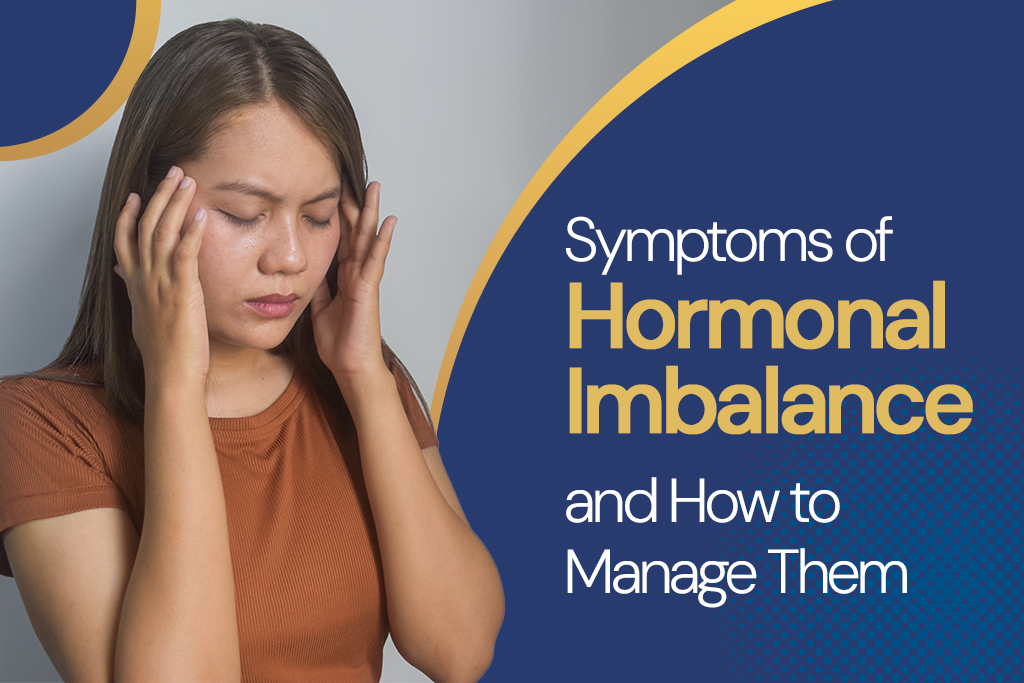We Are Now Open On Saturdays

All women and everyone assigned female at birth (AFAB) undergo shifting hormones. These chemical messengers influence almost every bodily function. Natural life stages like periods, pregnancy, and menopause trigger major changes. Yet, these are not the only causes of hormonal imbalance.
Spotting signs of hormonal dysfunction early can help reveal hidden health issues and guide you toward relief.
This blog looks into everything you should know about hormone imbalance.
Naturally, the body makes over 50 hormones. They work together like instruments in a band, and even a slight change can disrupt the harmony.
Hormones are usually released by organs and tissues into your bloodstream. They then move through the body and help regulate growth, mood, metabolism, reproduction and sexual function.
However, when your body makes too little or too much of one hormone, it may affect any of these functions.
Hormone levels in persons AFAB can shift during certain stages of life. Age changes how hormones are produced and how well they work. Puberty is another stage that affects hormone balance.
Not all imbalances come from natural changes. Some medical conditions can also interfere with hormone production, including:
Hormones can also be affected by:
Noticing a hormonal imbalance is not always easy. Symptoms differ based on the hormones that are affected and in what way.
For those assigned female at birth, common signs include:
While periods can shift for various reasons, hormones are often involved. An imbalance may cause your cycle to becomefrequent, absent, irregular and heavy.
Most of these changes link back to oestrogen levels. However, diet, mental health, exercise, and other conditions can also affect your period.
Hormones control the structure and natural cycle of your hair. When they fall out of balance, you may see changes. For instance, during pregnancy, many people notice thicker and fuller hair.
Hair loss, as well as hirsutism (unusual hair growth), can signal an imbalance. Coarse hair on the chin or face often means the body is making excessive male hormones. Likewise, hair thinning or loss can point to thyroid problems.
Hormones also influence skin tone and texture. A rise in progesterone, such as during pregnancy, may trigger acne on the face, back or chest.
In addition, shifts in oestrogen or progesterone can lead to hyperpigmentation—dark spots on the skin. These spots often appear on the groin, neck, or beneath the breasts.
Changes in oestrogen levels, especially with age, can affect sexual health. You may thus notice low sex drive, vaginal dryness and pain during intercourse.
Hormonal imbalance can as welllead to vaginal atrophy. This is when the vaginal walls become thin and inflamed. It usually occurs after menopause when the levels of oestrogen drop.
Unexplained weight gain or loss is often a warning sign. These changes may point to hormone problems. After menopause, weight gain is common because sex hormones tend to decline.Weight changes are also linked to hormone-related problems like polycystic ovary syndrome (PCOS), thyroid disorders and Cushing’s syndrome.
A drop in oestrogen can lower serotonin, the brain chemical that supports a stable mood. Low levels can disrupt brain and nerve communication, leading to depression, anxiety and irritability.
These mental health shifts normally disrupt sleep. Hormone imbalance may also be associated with difficulty falling asleep, waking often at night, and night sweats.
Oestrogen and progesterone influence metabolism and the digestive system. When these hormones are off balance, gut function can be affected. This may cause problems such as constipation or diarrhoea.
Studies have linked hormone imbalance in persons AFAB to irritable bowel syndrome (IBS). Digestive problems are also common during menstruation, when hormone levels in the blood shift.
Detecting hormonal imbalances is not always simple. There is no one test that checks every hormone. Some home kits measure certain levels; however, the safest step is to talk to your doctor. They can look at your overall health and run the right tests to guide treatment.
Diagnosis may comprise:
Hormonal imbalance treatment options may include:
Some natural remedies may also help raise oestrogen, but always ask your doctor before trying them.
While not all hormone imbalances can be prevented, you can take steps to support your overall health and promote balance. Helpful habits include:
Hormonal imbalances can affect women and people AFAB's health, from mood and sleep to weight, skin, and reproductive function. Because symptoms vary, it is very important not to ignore changes in your body. If you suspect a problem, seek medical advice rather than self-diagnosing. Most hormone-related issues can be managed with the right tests and treatment.
Schedule an appointment at South Kensington MD today if you are experiencing symptoms of a hormonal imbalance. Early guidance and treatment can make a big difference in restoring balance and protecting your health.

